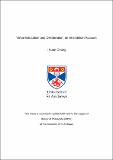Files in this item
Virtue education and deliberation : an Aristotelian account
Item metadata
| dc.contributor.advisor | Broadie, Sarah | |
| dc.contributor.advisor | Timmermann, Jens | |
| dc.contributor.author | Chong, I Xuan | |
| dc.coverage.spatial | 159 p. | |
| dc.date.accessioned | 2021-01-11T14:59:03Z | |
| dc.date.available | 2021-01-11T14:59:03Z | |
| dc.date.issued | 2020-07-27 | |
| dc.identifier.uri | https://hdl.handle.net/10023/21260 | |
| dc.description.abstract | Building on a philosophical reconstruction of Aristotle, this dissertation argues for a non-intellectualist account of virtue education and practical deliberation. This dissertation will first examine the notion of habituation. It argues that habituation consists in immersing into a certain cultural context, through which one will develop one’s unique ethical sense and will know what is noble and fine. This rules out two intellectualist positions: that habituation gives us a firm understanding of eudaimonia, and that habituation itself involves the exercise of the practical intellect. The non-intellectualised account of habituation is further supported by a topic-specific study of Aristotle’s conception of children. In cultivating the seeds of virtues that are accessible even to children, one forms evaluative appearances about what is and what is not worth-pursuing by generalising from particular evaluative experiences. These experiences may come from early private education, perceptions, emotions, imitation of others’ attitudes and behaviour, and understanding one’s friends’ decisions. These experiences help shape one’s ethical sense. Developing friendship (philia) appears to be ethically important, since we learn about values through friendship, and since practical deliberation is more like imagining conversations between individuals we are familiar with. This is in stark contrast to the intellectualist account of excellent deliberation, which consists in deliberating through a comprehensive conception of human values. But ultimately, friendship is ethically indispensable because, as a form of intimate relationship between agents of equal status, it epitomises an Aristotelian ideal: an egalitarian ethical community. Arguably, this community constitutes the context for habituation (immersion). This dissertation shows how opposing positions concerning a variety of particular issues become an opposition between two philosophical packages, one of intellectualist and one of non-intellectualist, and why the non-intellectualist one is closer to the truth. | en |
| dc.language.iso | en | en_US |
| dc.subject.lcc | B491.V57C5 | |
| dc.subject.lcsh | Aristotle. Nicomachean ethics | en |
| dc.subject.lcsh | Ethics | en |
| dc.title | Virtue education and deliberation : an Aristotelian account | en_US |
| dc.type | Thesis | en_US |
| dc.type.qualificationlevel | Doctoral | en_US |
| dc.type.qualificationname | MPhil Master of Philosophy | en_US |
| dc.publisher.institution | The University of St Andrews | en_US |
This item appears in the following Collection(s)
Items in the St Andrews Research Repository are protected by copyright, with all rights reserved, unless otherwise indicated.

